American Imperialism .
VerifiedAdded on 2023/05/27
|5
|1039
|333
AI Summary
This essay discusses the concept of colonialism in the context of the United States of America, analyses the reasons for the imperialistic notions of the people of the United States, and concludes with the significance and the ensuing impact of colonialism on the whole world.
Contribute Materials
Your contribution can guide someone’s learning journey. Share your
documents today.
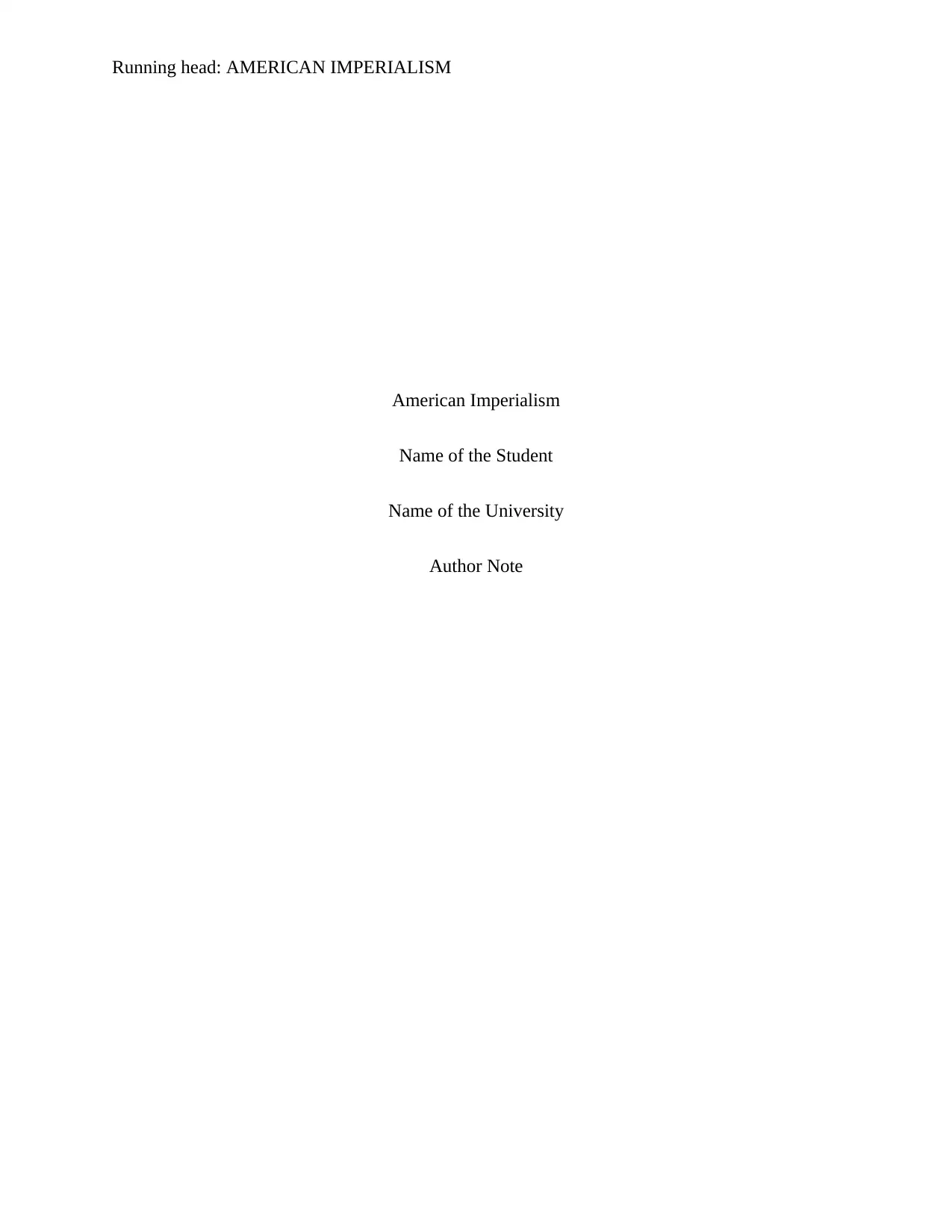
Running head: AMERICAN IMPERIALISM
American Imperialism
Name of the Student
Name of the University
Author Note
American Imperialism
Name of the Student
Name of the University
Author Note
Secure Best Marks with AI Grader
Need help grading? Try our AI Grader for instant feedback on your assignments.
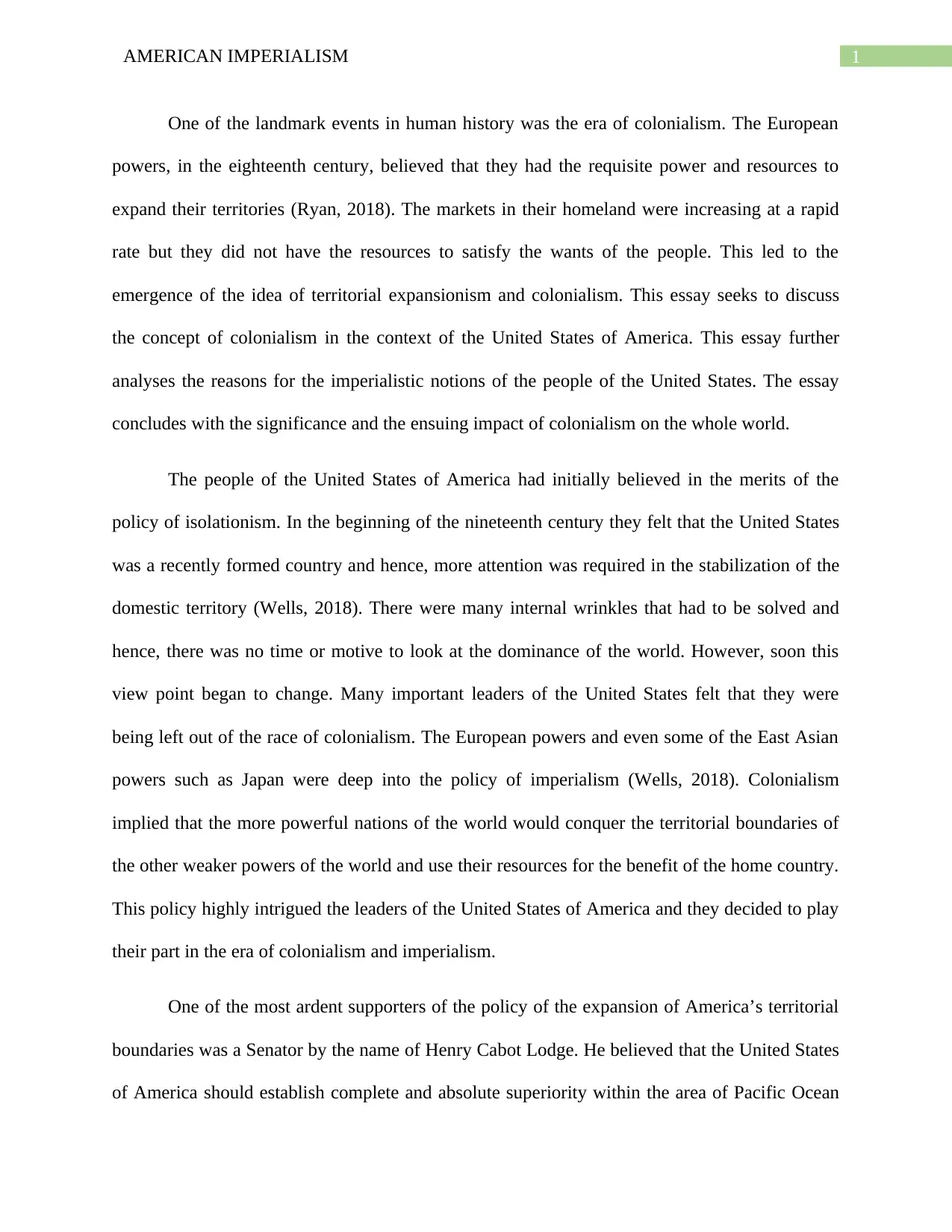
1AMERICAN IMPERIALISM
One of the landmark events in human history was the era of colonialism. The European
powers, in the eighteenth century, believed that they had the requisite power and resources to
expand their territories (Ryan, 2018). The markets in their homeland were increasing at a rapid
rate but they did not have the resources to satisfy the wants of the people. This led to the
emergence of the idea of territorial expansionism and colonialism. This essay seeks to discuss
the concept of colonialism in the context of the United States of America. This essay further
analyses the reasons for the imperialistic notions of the people of the United States. The essay
concludes with the significance and the ensuing impact of colonialism on the whole world.
The people of the United States of America had initially believed in the merits of the
policy of isolationism. In the beginning of the nineteenth century they felt that the United States
was a recently formed country and hence, more attention was required in the stabilization of the
domestic territory (Wells, 2018). There were many internal wrinkles that had to be solved and
hence, there was no time or motive to look at the dominance of the world. However, soon this
view point began to change. Many important leaders of the United States felt that they were
being left out of the race of colonialism. The European powers and even some of the East Asian
powers such as Japan were deep into the policy of imperialism (Wells, 2018). Colonialism
implied that the more powerful nations of the world would conquer the territorial boundaries of
the other weaker powers of the world and use their resources for the benefit of the home country.
This policy highly intrigued the leaders of the United States of America and they decided to play
their part in the era of colonialism and imperialism.
One of the most ardent supporters of the policy of the expansion of America’s territorial
boundaries was a Senator by the name of Henry Cabot Lodge. He believed that the United States
of America should establish complete and absolute superiority within the area of Pacific Ocean
One of the landmark events in human history was the era of colonialism. The European
powers, in the eighteenth century, believed that they had the requisite power and resources to
expand their territories (Ryan, 2018). The markets in their homeland were increasing at a rapid
rate but they did not have the resources to satisfy the wants of the people. This led to the
emergence of the idea of territorial expansionism and colonialism. This essay seeks to discuss
the concept of colonialism in the context of the United States of America. This essay further
analyses the reasons for the imperialistic notions of the people of the United States. The essay
concludes with the significance and the ensuing impact of colonialism on the whole world.
The people of the United States of America had initially believed in the merits of the
policy of isolationism. In the beginning of the nineteenth century they felt that the United States
was a recently formed country and hence, more attention was required in the stabilization of the
domestic territory (Wells, 2018). There were many internal wrinkles that had to be solved and
hence, there was no time or motive to look at the dominance of the world. However, soon this
view point began to change. Many important leaders of the United States felt that they were
being left out of the race of colonialism. The European powers and even some of the East Asian
powers such as Japan were deep into the policy of imperialism (Wells, 2018). Colonialism
implied that the more powerful nations of the world would conquer the territorial boundaries of
the other weaker powers of the world and use their resources for the benefit of the home country.
This policy highly intrigued the leaders of the United States of America and they decided to play
their part in the era of colonialism and imperialism.
One of the most ardent supporters of the policy of the expansion of America’s territorial
boundaries was a Senator by the name of Henry Cabot Lodge. He believed that the United States
of America should establish complete and absolute superiority within the area of Pacific Ocean
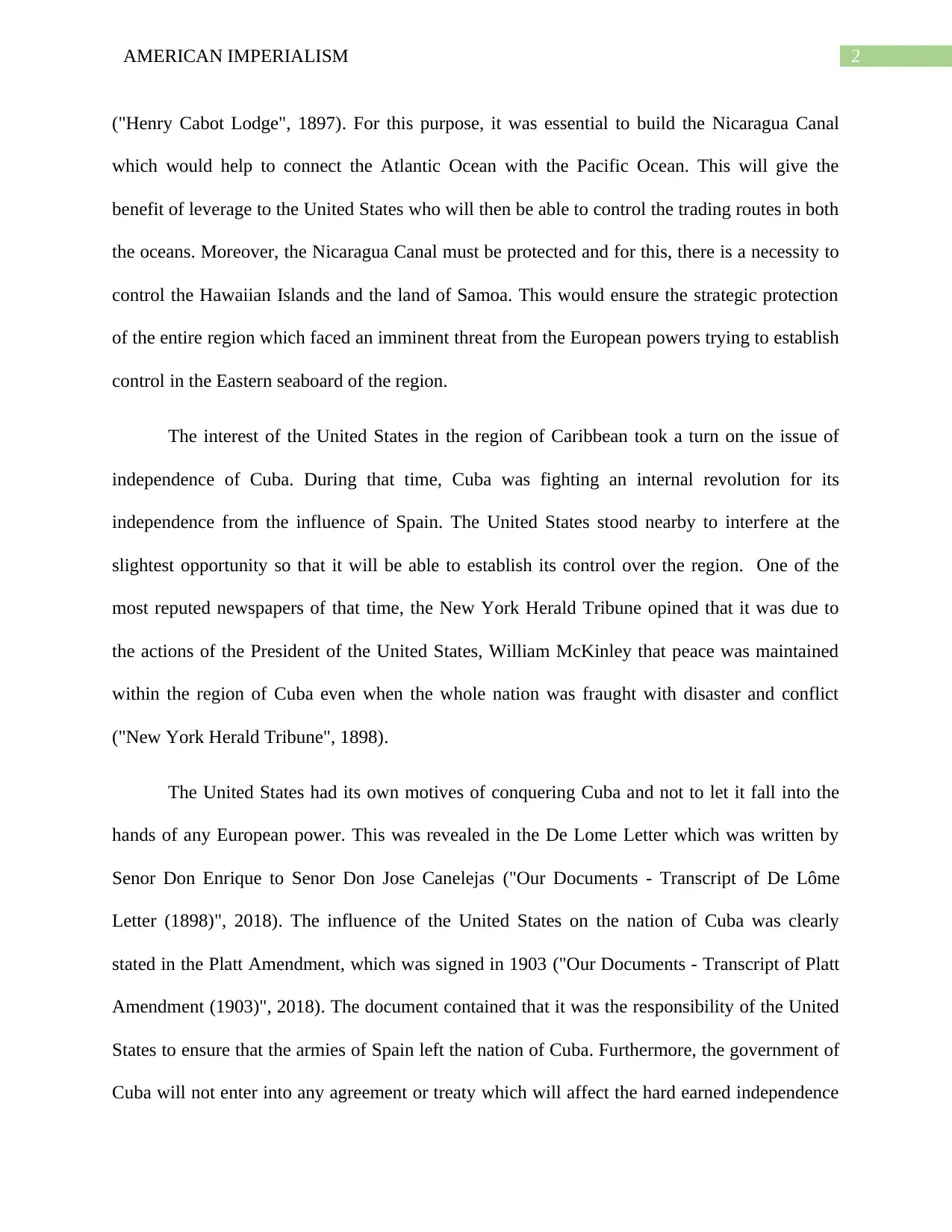
2AMERICAN IMPERIALISM
("Henry Cabot Lodge", 1897). For this purpose, it was essential to build the Nicaragua Canal
which would help to connect the Atlantic Ocean with the Pacific Ocean. This will give the
benefit of leverage to the United States who will then be able to control the trading routes in both
the oceans. Moreover, the Nicaragua Canal must be protected and for this, there is a necessity to
control the Hawaiian Islands and the land of Samoa. This would ensure the strategic protection
of the entire region which faced an imminent threat from the European powers trying to establish
control in the Eastern seaboard of the region.
The interest of the United States in the region of Caribbean took a turn on the issue of
independence of Cuba. During that time, Cuba was fighting an internal revolution for its
independence from the influence of Spain. The United States stood nearby to interfere at the
slightest opportunity so that it will be able to establish its control over the region. One of the
most reputed newspapers of that time, the New York Herald Tribune opined that it was due to
the actions of the President of the United States, William McKinley that peace was maintained
within the region of Cuba even when the whole nation was fraught with disaster and conflict
("New York Herald Tribune", 1898).
The United States had its own motives of conquering Cuba and not to let it fall into the
hands of any European power. This was revealed in the De Lome Letter which was written by
Senor Don Enrique to Senor Don Jose Canelejas ("Our Documents - Transcript of De Lôme
Letter (1898)", 2018). The influence of the United States on the nation of Cuba was clearly
stated in the Platt Amendment, which was signed in 1903 ("Our Documents - Transcript of Platt
Amendment (1903)", 2018). The document contained that it was the responsibility of the United
States to ensure that the armies of Spain left the nation of Cuba. Furthermore, the government of
Cuba will not enter into any agreement or treaty which will affect the hard earned independence
("Henry Cabot Lodge", 1897). For this purpose, it was essential to build the Nicaragua Canal
which would help to connect the Atlantic Ocean with the Pacific Ocean. This will give the
benefit of leverage to the United States who will then be able to control the trading routes in both
the oceans. Moreover, the Nicaragua Canal must be protected and for this, there is a necessity to
control the Hawaiian Islands and the land of Samoa. This would ensure the strategic protection
of the entire region which faced an imminent threat from the European powers trying to establish
control in the Eastern seaboard of the region.
The interest of the United States in the region of Caribbean took a turn on the issue of
independence of Cuba. During that time, Cuba was fighting an internal revolution for its
independence from the influence of Spain. The United States stood nearby to interfere at the
slightest opportunity so that it will be able to establish its control over the region. One of the
most reputed newspapers of that time, the New York Herald Tribune opined that it was due to
the actions of the President of the United States, William McKinley that peace was maintained
within the region of Cuba even when the whole nation was fraught with disaster and conflict
("New York Herald Tribune", 1898).
The United States had its own motives of conquering Cuba and not to let it fall into the
hands of any European power. This was revealed in the De Lome Letter which was written by
Senor Don Enrique to Senor Don Jose Canelejas ("Our Documents - Transcript of De Lôme
Letter (1898)", 2018). The influence of the United States on the nation of Cuba was clearly
stated in the Platt Amendment, which was signed in 1903 ("Our Documents - Transcript of Platt
Amendment (1903)", 2018). The document contained that it was the responsibility of the United
States to ensure that the armies of Spain left the nation of Cuba. Furthermore, the government of
Cuba will not enter into any agreement or treaty which will affect the hard earned independence
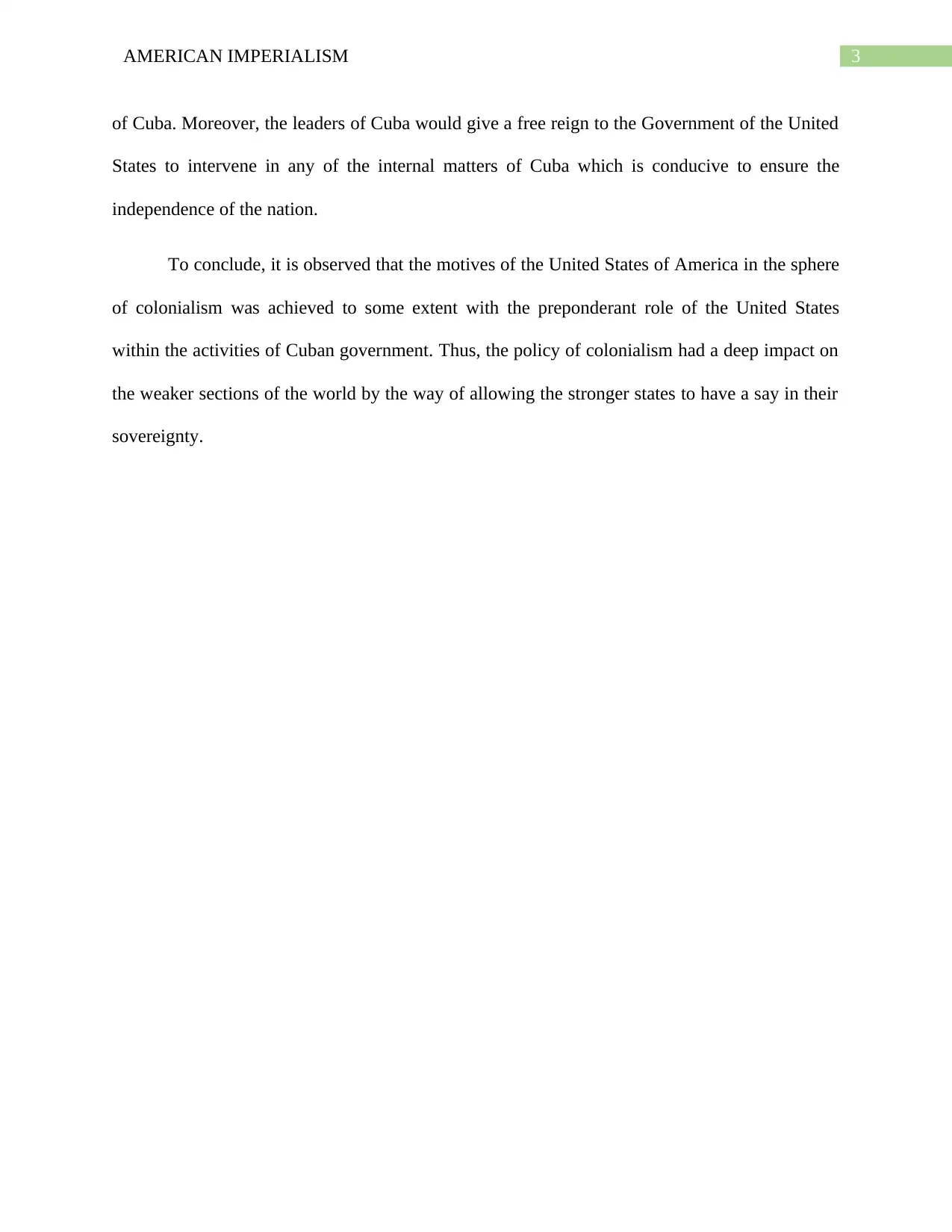
3AMERICAN IMPERIALISM
of Cuba. Moreover, the leaders of Cuba would give a free reign to the Government of the United
States to intervene in any of the internal matters of Cuba which is conducive to ensure the
independence of the nation.
To conclude, it is observed that the motives of the United States of America in the sphere
of colonialism was achieved to some extent with the preponderant role of the United States
within the activities of Cuban government. Thus, the policy of colonialism had a deep impact on
the weaker sections of the world by the way of allowing the stronger states to have a say in their
sovereignty.
of Cuba. Moreover, the leaders of Cuba would give a free reign to the Government of the United
States to intervene in any of the internal matters of Cuba which is conducive to ensure the
independence of the nation.
To conclude, it is observed that the motives of the United States of America in the sphere
of colonialism was achieved to some extent with the preponderant role of the United States
within the activities of Cuban government. Thus, the policy of colonialism had a deep impact on
the weaker sections of the world by the way of allowing the stronger states to have a say in their
sovereignty.
Secure Best Marks with AI Grader
Need help grading? Try our AI Grader for instant feedback on your assignments.
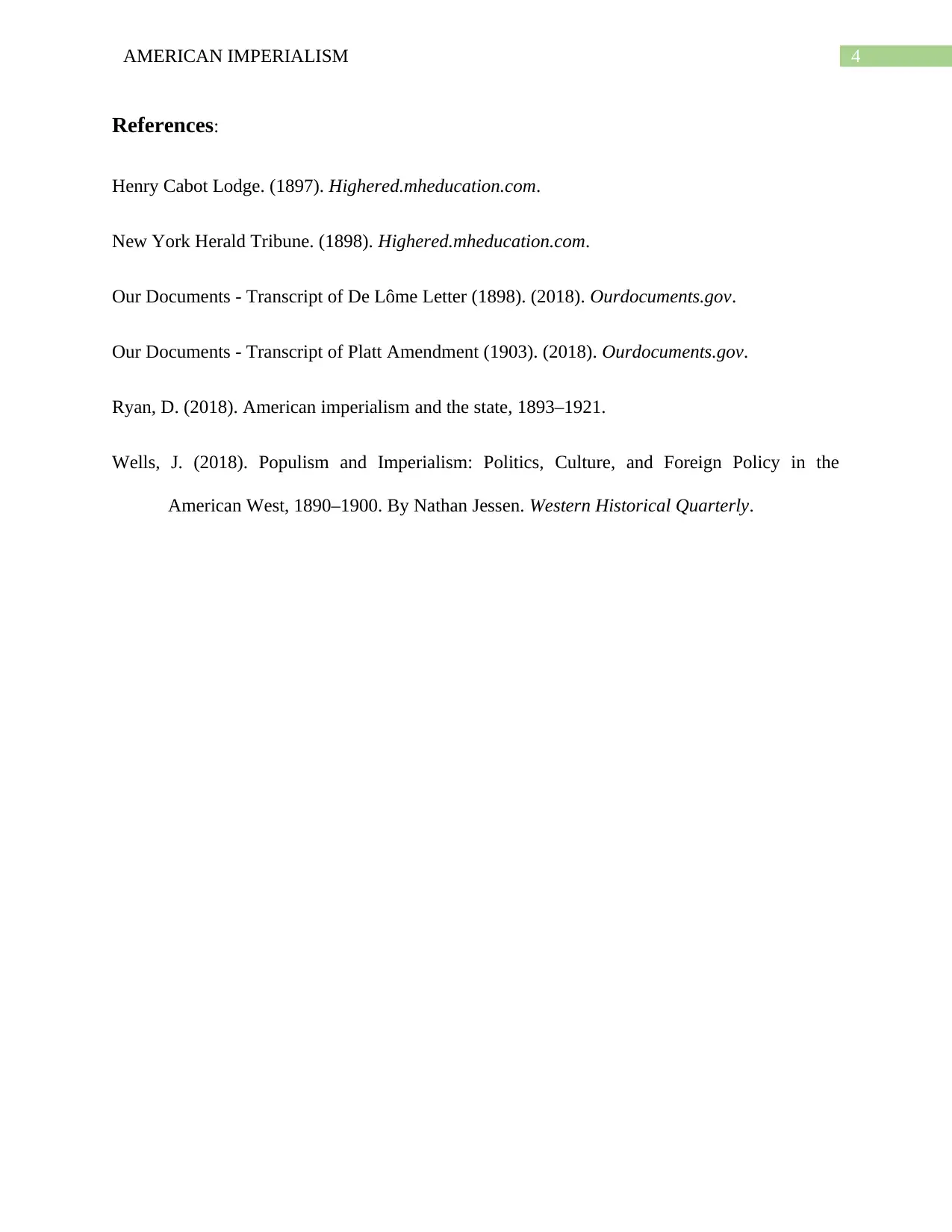
4AMERICAN IMPERIALISM
References:
Henry Cabot Lodge. (1897). Highered.mheducation.com.
New York Herald Tribune. (1898). Highered.mheducation.com.
Our Documents - Transcript of De Lôme Letter (1898). (2018). Ourdocuments.gov.
Our Documents - Transcript of Platt Amendment (1903). (2018). Ourdocuments.gov.
Ryan, D. (2018). American imperialism and the state, 1893–1921.
Wells, J. (2018). Populism and Imperialism: Politics, Culture, and Foreign Policy in the
American West, 1890–1900. By Nathan Jessen. Western Historical Quarterly.
References:
Henry Cabot Lodge. (1897). Highered.mheducation.com.
New York Herald Tribune. (1898). Highered.mheducation.com.
Our Documents - Transcript of De Lôme Letter (1898). (2018). Ourdocuments.gov.
Our Documents - Transcript of Platt Amendment (1903). (2018). Ourdocuments.gov.
Ryan, D. (2018). American imperialism and the state, 1893–1921.
Wells, J. (2018). Populism and Imperialism: Politics, Culture, and Foreign Policy in the
American West, 1890–1900. By Nathan Jessen. Western Historical Quarterly.
1 out of 5
Related Documents
Your All-in-One AI-Powered Toolkit for Academic Success.
+13062052269
info@desklib.com
Available 24*7 on WhatsApp / Email
![[object Object]](/_next/static/media/star-bottom.7253800d.svg)
Unlock your academic potential
© 2024 | Zucol Services PVT LTD | All rights reserved.




